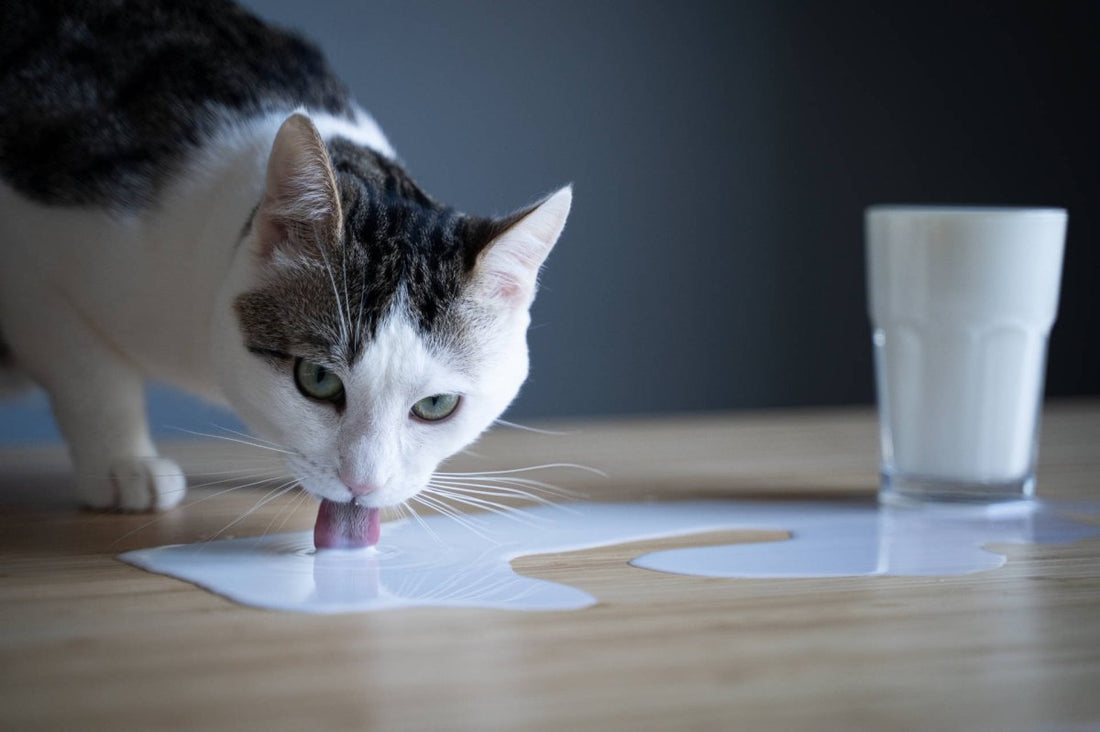Milk for cats: Should the classic be in the bowl or is it better not to?
The image of a purring cat gleefully lapping milk from a bowl is iconic. But is milk really healthy for cats? The answer is surprising: Many cats don't tolerate milk well. While kittens depend on milk in their early stages of life, adult cats can have difficulty digesting regular cow's milk. In this blog, we clarify the biggest misconceptions about milk for cats and show suitable alternatives.
Can cats drink milk? The short answer
Yes, cats can drink milk—but not just any kind. Most cats are lactose intolerant, meaning they often don't tolerate regular cow's milk well. Lactose-free milk or special cat milk are better suited because they are easier to digest.
What is allowed?
- Lactose-free milk for cats.
- Special cat milk from the store.
What is forbidden?
- Regular cow's milk.
- Sweetened or flavored dairy products.
Why can't cats tolerate regular milk?
The main reason many cats can't tolerate regular cow's milk is lactose. Lactose is a milk sugar that adult cats have difficulty digesting.
1. What is lactose?
- Lactose is a sugar found in milk.
- To digest lactose, the enzyme lactase is needed.
2. Lactose intolerance in cats
- Kittens produce lactase as long as they drink their mother's milk. With weaning, production of this enzyme decreases.
- Many adult cats are therefore lactose intolerant and react to normal milk with diarrhea, flatulence or abdominal pain.
Which milk is suitable for cats?
If you want to give your cat milk, make sure you choose the right type. Here are the best options:
1. Lactose-free milk
- Lactose-free milk is well tolerated by cats and is a suitable alternative to regular cow's milk.
2. Special cat milk
- Commercial cat milk is specifically formulated for the needs of cats. It is lactose-free and often contains additional nutrients.
3. Plant-based milk alternatives
- Some plant-based milks, such as coconut milk or oat milk, are lactose-free, but often contain sugar or additives that are unsuitable for cats.
Why is cat milk better than regular milk?
Cat milk is specially developed for the needs of cats and is therefore better tolerated. It contains no milk sugar (lactose) and is generally lower in calories than regular cow's milk.
Benefits of cat milk:
- Lactose-free: No digestive problems due to lactose.
- Fortified: Often contains additional nutrients such as vitamins and minerals.
- Easy to digest: Well suited for sensitive stomachs.
How much milk can cats drink?
Milk should always be offered in small amounts and as an occasional snack. It does not replace a full meal and should not be the primary source of fluid.
Recommended amount:
- Small cats: 20–30 ml per week.
- Medium-sized cats: 50 ml per week.
- Large cats: Up to 100 ml per week.
Risks and side effects of milk in cats
Although cats love milk, it can cause health problems if the wrong choice is made or if overfed:
1. Digestive problems
- Diarrhea, flatulence and abdominal pain are common consequences of lactose intolerance.
2. Obesity
- Milk contains calories and fat, which can lead to weight gain if consumed in excess.
3. Allergies
- Some cats are allergic to milk proteins.
4. Dehydration
- Cats should never be given milk as a substitute for water, as it does not have the same hydrating effect.
How do you know if your cat can tolerate milk?
If you want to give your cat milk, you should first observe her reaction. Look for the following symptoms:
Signs of intolerance:
- Diarrhea or loose stools.
- Vomit.
- Loss of appetite.
- Bloating or abdominal pain.
If your cat reacts to milk with these symptoms, it is probably lactose intolerant and should no longer be given regular milk.
Alternatives to milk for cats
If your cat can't tolerate milk, there are many other ways to treat them with delicious and healthy snacks:
1. Water
- The best source of fluid for cats remains water – always fresh and accessible.
2. Wet food
- Contains a high water content and provides your cat with fluids.
3. Broth
- Unsalted chicken or beef broth can be a tasty alternative.
Creative ways to offer milk to cats
If your cat loves milk and tolerates it, you can serve it in several ways:
1. Milk as a snack
- Give your cat a small sip of lactose-free milk or cat milk as a reward.
2. Milk ice cubes
- Freeze cat milk in ice cube trays – perfect for hot days!
3. Milk with treats
- Mix cat milk with a small piece of wet food to spice up the meal.
Frequently asked questions about milk for cats
“Can kittens drink regular milk?”
No, kittens shouldn't drink regular milk either, as they are often lactose intolerant. Cat milk is a better choice.
“Is lactose-free milk safe for cats?”
Yes, lactose-free milk is well tolerated by cats in small quantities.
“Can cats get diarrhea from milk?”
Yes, if you are lactose intolerant, milk can cause digestive problems such as diarrhea.
“What alternatives are there to cat milk?”
Unsalted broth or water are the best alternatives.
Conclusion: Milk for cats – myth or healthy treat?
While the image of a cat drinking milk is charming, in reality, milk is difficult for many cats to digest. The most important points at a glance:
- Suitable: Lactose-free milk or cat milk in small quantities.
- Benefits: Provides protein and nutrients.
- Caution: Regular cow's milk can cause digestive problems.
If you want to give your cat milk, choose a suitable variety and make sure to feed it only occasionally and in small amounts. Your cat will enjoy the special treat—and you can indulge them with a clear conscience!



